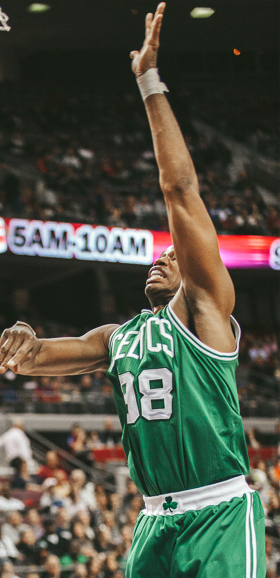In the last few weeks, three events have brought sex and sport to the forefront of public and media attention again, but, this time, two of the three stories have been positive, one even prompting President Obama to issue a statement of support.
On April 11, the National Hockey League (NHL) and the NHL Players' Association announced a partnership with the "You Can Play Project," an advocacy organization formed in March 2012 to fight homophobia in sport and to promote inclusive sporting communities. The project focuses on education and training about LGBT issues for teams, players, media and fans, as well as producing and broadcasting public service announcements.
"You Can Play" was founded by Philadelphia Flyers scout Patrick Bourke, son of NHL general manager Brian Burke. Patrick's brother, Brendan, an openly gay university hockey player, was killed in a car accident in 2010, just a few months after Brian had spoken out publicly about his love and support for his gay son. Since 2012, more than 100 professional hockey players and athletes representing 20 NCAA organizations have joined in supporting gay teammates, a step that itself signifies the possibility of a sea change in professional sport. The "You Can Play" website also provides practical advice for LGBT athletes in crisis; for those struggling with their sexuality, there is an Athlete Buddy System.
On April 29, came the big coming out story: Jason Collins announced, "I'm a 34-year-old NBA centre. I'm Black. And I'm gay." His statement marked the first time that an active NBA player had publicly come out as gay. In most instances in the past, gay male professional athletes have waited until after their retirement before taking this step, fearing backlash from teammates, fans, sponsors and the media.

Some lesbian athletes, on the other hand, have come out during their playing careers, most recently, US professional soccer player Megan Rapinoe. And, among Olympic athletes, a list by www.Outsports.com compiled before the 2012 Olympics comprised 20 openly lesbian women but only three openly gay men. From anecdotal accounts of coming out gay or lesbian in sport contexts, it appears that male athletes fear physical retaliation as well as ostracism, not only at the hands of opposing teams, but also from their own teammates, a concern that may account for this gender disparity.
In this homophobic climate, it's interesting to read reactions to Jason Collins' statement. Most players and coaches who spoke to the media were supportive, noting his courage, his commitment to the sport and his positive example to youth. President Obama was among those who took this position, saying he was impressed by Collins' courage.
However, there were exceptions. Comments on blogs, unsurprisingly, ranged from supportive to homophobic, as did opinion pieces in the mainstream media, with most critics citing the "homosexuality is a sin" argument (although some later apologized). More cynical comments claimed that Collins was at the end of his career anyway, so had less to lose by coming out.
Some athletes who publicly supported Collins were themselves targeted by homophobic elements in their communities. Former Green Bay Packer LeRoy Butler, for example, was "fired" from a speaking engagement at a church after sending a supportive tweet to Collins. In this environment, it seemed that even being an ally of a LBGT person constituted a sin.
Among NBA players, another interesting theme emerged. Many said that his sexual orientation was not a factor, and that the only thing that mattered was how he played basketball. In fact, on the question of fans' possible negative reaction, Collins himself claimed that "a lot of ill feelings can be cured by winning."
This raises some questions. If Collins' game goes downhill from now on, will people think that his gayness is the cause? And why should there be a double standard? As feminists used to say, "Women have to be twice as good as men to go half as far." Does this apply to lesbian and gay athletes too?
Cherry, but not on top
Finally, a story about Don Cherry, the Canadian hockey commentator who never disappoints when it come to Neanderthal opinions. On May 1, he suggested that female reporters should not be allowed in the men's locker room. They need to be respected and protected from the "disgusting" things that go on there, he said, because he puts women "on a pedestal."
Arguments that the locker room was reporters' workplace, and hence, subject to equality legislation, fell on deaf ears, as Cherry repeated his position a few days later. Some asked why any interviews need to be conducted among naked or half-naked men, but it seems that tradition trumps common sense on this question. Overall, Cherry's view was roundly criticized as a relic of a past era.
A good start
So, at the end of the day, is it premature to say that progressive voices have prevailed on questions of sexuality, gender and sport? A US president doesn't usually comment on the sexual preference of an individual man or woman, but a celebrity athlete is by definition a public figure, and Jason Collins provided a good opportunity to reinforce anti-homophobic and anti-bullying messages. Gay men in non-team sports - figure skaters and divers, for example - have paved the way for other gay athletes to come out publicly, as have the significant number of lesbians in both amateur and professional sport. As Collins said, he's been waiting for someone else to raise his hand, but, in the "don't ask, don't tell" climate of men's professional sport, no one did, so it was up to him. Overall, the success of "You Can Play," the generally positive response to Jason Collins, and the negative reaction to Don Cherry, signals changing attitudes and practices,and is a good start.
Helen Jefferson Lenskyj is Professor Emerita at the University of Toronto who writes frequently on issues of gender and sexuality in sport.
Posted May 6, 2013








